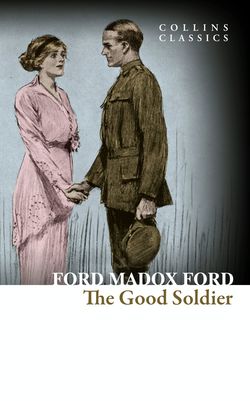Читать книгу The Good Soldier: A Tale of Passion - Ford Madox Ford - Страница 6
ОглавлениеAbout the Author
Ford Madox Ford (1873–1939) was an English novelist, poet, critic and editor. He was born Ford Hermann Hüffer, but changed his name due to anti-German sentiment following the First World War. During the war he worked for the War Propaganda Bureau, rallying support from overseas allies and encouraging civilians to sign up. Ford wrote many other novels both before and after The Good Soldier; among his best-known works are The Fifth Queen trilogy, a series of connected historical novels based on Henry VIII’s fifth wife, Catherine Howard, and the Parade’s End tetralogy, written during the post-war years and largely based on life on the Western Front.
Ford’s grandfather was the Victorian realist artist Ford Madox Brown, who specialised in paintings that documented the industrialisation and scientific revolution of England. Ford continued to explore similar ideas – although through a different artistic form – since he was also writing during a period of great societal change and preoccupied with the effect of progress on the human psyche. As science and technology keep our environment in perpetual flux, so human behaviour must adapt as we learn to cope with unexpected circumstances, for better or worse.
The Good Soldier
The Good Soldier was published in 1915, a year after the start of the First World War, though it is set just before its outbreak. Ford originally intended to call his novel The Saddest Story; however, the proposed title was thought inappropriate so The Good Soldier – sarcastically suggested – became its replacement.
The story, which spans a number of years, is narrated by John Dowell, who forms half of one of the two couples around whom the plot centres. It depicts the unhappy events that lead to the unravelling of the two couples’ relationships, deaths of three characters and the descent into madness of a fourth. As the first-person narrator, Dowell has a monopoly on the information he imparts to the reader, and as such we are never quite sure whether he unwittingly allows the unfortunate events of the novel to happen, or whether he is deliberately engineering these outcomes. The rambling, non-chronological narrative and inconsistencies in the plot also serve to make the reader suspicious, leaving us unsure as to whether Dowell is sincere or duplicitous. Another interpretation could be that these inconsistencies are intended to give the impression of realism: human memory is highly subjective and prone to inconsistencies when recounting events. At any rate, Dowell’s unreliability as a narrator means that the reader is kept at arm’s length, afforded only an impression of the events and characters in the novel rather than the full picture, and is consequently unsure of the ‘truth’ of the story. This is a clever technique to draw the reader in, as ultimately it falls to us to form our own conclusions about how events played out, Dowell’s motives, and the real part he played in the story he is recounting. In the end, we are left with the impression of Dowell’s apathy – he no longer cares about the pain and suffering wreaked on his life and recounts events from a dispassionate stance, jaded and disappointed by both himself and others.
The Good Soldier touches on the human condition of its setting. The Edwardian era was one of transition, and the idea of an imposed structure on society – the qualified education, the nine-to-five working day, the singular career, the retirement age – were symptoms of industrialisation and, some might suggest, repressed the free spirit. Ford could be suggesting in The Good Soldier that this unnatural environment compelled many people to react in a primal way: when humans feel that certain elements of their lives are beyond their control they naturally look to those elements that they can control – in this case, personal relationships. One of the themes of the novel is the pursuit of sexual gratification at the expense of a stable relationship, which leads to jealousies, resentments, upsets – even suicide. Ford taps into a symptom of modern society: the relative democratic freedom which allowed this rebellion against society’s newly imposed structures manifested itself in a rise in less permanent, more transient relationships. This freedom came at the expense of marriage, which demanded emotional investment and represented stability. Ford paints a picture of flawed human nature, and the struggle to reconcile these social and personal conflicts. It is also possible that Ford’s personal situation informed his writing – his own marriage sadly disintegrated and he suffered a psychological breakdown some ten years prior to the novel’s publication.
Often cited as an exponent of literary impressionism, The Good Soldier has become established as a seminal and pioneering work that defied genre norms and advocated a more experimental approach, ultimately playing a significant role in shaping the course of twentieth-century literature.
